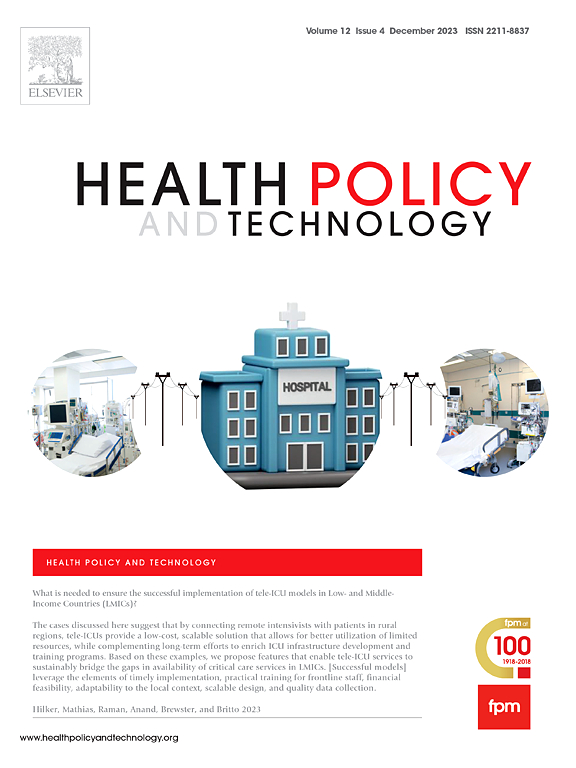Systematic review of transferred costs in economic evaluations from the Middle East North Africa Region
IF 3.7
3区 医学
Q1 HEALTH POLICY & SERVICES
引用次数: 0
Abstract
Objectives
The Middle East and North Africa (MENA) region is striving to provide their populations with quality healthcare. The challenge for MENA countries is aggravated by the scarcity of health-related cost data which strains their health systems and puts pressure on decision-makers to efficiently allocate resources. Transferring costs from another setting might be a suitable solution to ease the resulting pressure. This paper aims to identify literature utilizing regionally transferred costs and to evaluate their methodology and reporting quality.
Methods
Literature search was performed in June 2022 to identify health economic evaluations which reported transferred costs from other jurisdictions between January 2000 and May 2022. Studies selection and data extraction were performed in duplicates. The Consolidated Health Economic Evaluation Reporting Standards 2022 and the Fukuda transparency categorization were used to evaluate the quality of the extracted costs.
Results
104 costs were examined from 13 studies. Cost transferability is a recent practice in the region with a slight lead of Gulf Council countries. The majority of donor costs were of poor quality and the selection of donor and destination countries was often poorly justified.
Conclusions
The applied methodology was heterogenous and authors have not referred to available international transferability guidelines. We propose a preliminary checklist for structured evaluation of cost-transfer methods to improve reporting tranparency and advance evidence-based health policy making in MENA.
Plain summary
The Middle East and North Africa region (MENA) is under significant challenge to implement health technology assessment practice following the scarcity of locally collected economic data. This systematic review explores the transferability of health-related costs as a potential solution to the scarcity of local cost data in the region. 13 studies which reported using 104 transferred costs from MENA countries were included in the final analysis. We concluded that cost transferability practice is recently adopted within MENA, and Golf region is slightly leading with 7 studies transferring over half of the included costs to Golf countries settings. No standard methodologies and references were reported by authors when transferring these costs and both reporting and selection criteria between donor and destination costs and countries were mostly of poor quality and often not justified. We propose a preliminary checklist for structured evaluation of cost transfer methods to improve reporting transparency and advance evidence-based health policy making in MENA.
对中东北非区域经济评价中的转移成本进行系统审查
目的中东和北非(MENA)地区正在努力为其人口提供优质医疗保健。与卫生有关的费用数据的缺乏使中东和北非国家面临的挑战更加严峻,这使这些国家的卫生系统不堪重负,并给决策者带来了有效分配资源的压力。从另一个环境转移成本可能是缓解由此产生的压力的合适解决方案。本文旨在确定利用区域转移成本的文献,并评估其方法和报告质量。方法于2022年6月进行文献检索,以确定2000年1月至2022年5月期间报告其他司法管辖区转移成本的卫生经济评估。研究选择和数据提取是重复进行的。采用综合卫生经济评估报告标准2022和福田透明度分类来评估提取成本的质量。结果从13项研究中检查了104项成本。成本转移是该区域最近的一种做法,海湾理事会国家略微领先。大多数捐助者的费用质量很差,捐助者和目的地国家的选择往往没有充分的理由。结论应用的方法是异质的,作者没有参考现有的国际可转移性指南。我们提出了一份初步清单,用于对成本转移方法进行结构化评估,以提高报告透明度,促进中东和北非地区以证据为基础的卫生政策制定。由于缺乏当地收集的经济数据,中东和北非地区(MENA)在实施卫生技术评估实践方面面临重大挑战。本系统综述探讨了卫生相关成本的可转移性,作为该地区当地成本数据稀缺的潜在解决方案。13项研究报告使用了来自中东和北非国家的104项转移费用,这些研究被列入最后的分析。我们的结论是,成本可转移性实践最近在中东和北非地区采用,高尔夫地区略微领先,有7项研究将超过一半的成本转移到高尔夫国家设置。在转移这些费用时,作者没有报告标准的方法和参考文献,捐助国和目的地费用和国家之间的报告和选择标准大多质量差,往往不合理。我们提出了一份初步清单,用于对成本转移方法进行结构化评估,以提高报告透明度,推动中东和北非地区以证据为基础的卫生政策制定。
本文章由计算机程序翻译,如有差异,请以英文原文为准。
求助全文
约1分钟内获得全文
求助全文
来源期刊

Health Policy and Technology
Medicine-Health Policy
CiteScore
9.20
自引率
3.30%
发文量
78
审稿时长
88 days
期刊介绍:
Health Policy and Technology (HPT), is the official journal of the Fellowship of Postgraduate Medicine (FPM), a cross-disciplinary journal, which focuses on past, present and future health policy and the role of technology in clinical and non-clinical national and international health environments.
HPT provides a further excellent way for the FPM to continue to make important national and international contributions to development of policy and practice within medicine and related disciplines. The aim of HPT is to publish relevant, timely and accessible articles and commentaries to support policy-makers, health professionals, health technology providers, patient groups and academia interested in health policy and technology.
Topics covered by HPT will include:
- Health technology, including drug discovery, diagnostics, medicines, devices, therapeutic delivery and eHealth systems
- Cross-national comparisons on health policy using evidence-based approaches
- National studies on health policy to determine the outcomes of technology-driven initiatives
- Cross-border eHealth including health tourism
- The digital divide in mobility, access and affordability of healthcare
- Health technology assessment (HTA) methods and tools for evaluating the effectiveness of clinical and non-clinical health technologies
- Health and eHealth indicators and benchmarks (measure/metrics) for understanding the adoption and diffusion of health technologies
- Health and eHealth models and frameworks to support policy-makers and other stakeholders in decision-making
- Stakeholder engagement with health technologies (clinical and patient/citizen buy-in)
- Regulation and health economics
 求助内容:
求助内容: 应助结果提醒方式:
应助结果提醒方式:


